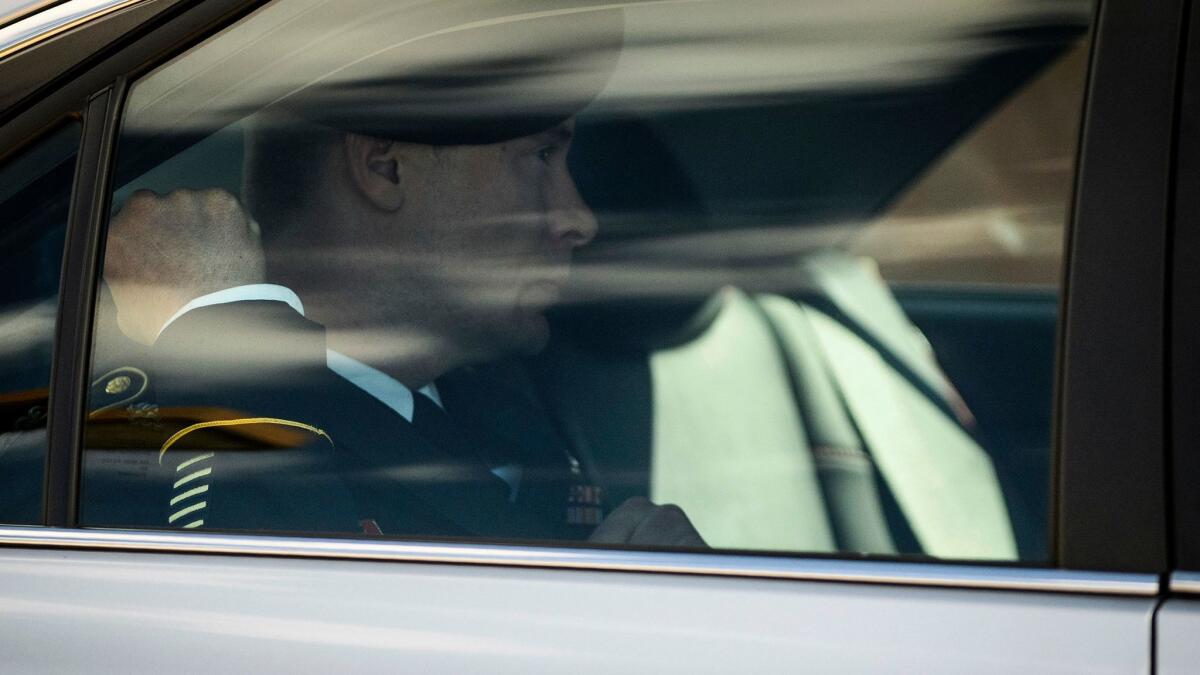Looking for Sgt. Bowe Bergdahl carried a heavy price, troops testify at his sentencing

James Hatch, a former Navy SEAL, limped into a small military courtroom in Ft. Bragg, N.C., on Wednesday with Mina, his service dog.
Taking the witness stand, he veered between stoicism and tears as he described a mission in Afghanistan that had resulted in 18 surgeries and left him permanently injured.
The helicopters carrying his men took heavy shrapnel fire before landing in the remote province of Paktika. The first victim that day was a military canine named Remco, who was shot in the head while leading the men through a poppy field.
Then enemy fire struck Hatch, shattering his right femur. He screamed in pain as a comrade applied a tourniquet.
âI was actually a hazard to guys around me at that point,â he testified. âI really thought I was going to die.â
The mission was one of several attempts to rescue Sgt. Bowe Bergdahl, who had left his combat command post in 2009, spent five years as a prisoner of the Taliban, and for his actions now faces the possibility of life in a U.S. prison. He pleaded guilty last week to two charges: deserting his post and endangering the lives of his fellow troops.
His sentencing hearing began Wednesday with a series of prosecution witnesses testifying about the hardships they endured after he vanished.
âEverybody on that mission was aware that he had walked off,â Hatch testified.
Asked why he and his team went to such lengths to rescue a man who had abandoned his post, Hatch responded: âBecause heâs an American.â
Later he added: âAnd he had a mom.â
The military judge presiding over the case, Col. Jeffery Nance, who will ultimately determine Bergdahlâs punishment, said from the bench Tuesday that he was still considering a motion by the defense to dismiss the case as a result of comments by President Trump.
Last year, as a presidential candidate, Trump called Bergdahl a âdirty rotten traitorâ who deserved to be executed by firing squad or ejected from a plane without a parachute.
Bergdahlâs defense team has repeatedly argued that Trumpâs comments constitute an âundue command influenceâ that has made a fair trial impossible: As commander in chief of the armed forces, Trump is the boss of everybody involved in the military hearing, including the judge.
Nance has called Trumpâs comments âdisturbing and disappointing,â but has said they did not amount to an unlawful command influence because they were made before he was elected.
The defense submitted a fresh motion to dismiss the case after Trump said last week he could not comment on the case, but then added: âI think people have heard my comments in the past.â
Dressed in his military uniform Wednesday, Bergdahl looked on intently but displayed no emotion as a string of soldiers described the rescue missions.
As thousands of troops scoured the region, Evan Buetow, a sergeant and team leader within Bergdahlâs platoon at the time, was one of only three men left behind for 10 days to guard the remote outpost near the small village of Mest.
Squeezed into the small bunker built in an old graveyard, littered with bones and crawling with dung beetles, Buetow suffered from flu and dysentery.
âIt was miserable,â he said. âThere were 10 days of whatever food you could get.⌠It didnât matter. We had a way bigger mission to focus on.â
Asked by a prosecutor why it was important to him to stay in that position, he began to sob.
âMy guy was gone,â he said.
Army Col. Clinton Baker, then Bergdahlâs battalion commander, said that some forces raided specific compounds based on intelligence while others went from house to house and village to village, searching the area and talking to people.
One platoon patrolled small villages for 37 days, until their clothing began to fall apart.
âWe had to fly socks and T-shirts to them because they had literally just rotted off them,â Baker said. âWe just didnât have a choice. We were all doing the best we could.â
With his platoon already busy and âmaxed outâ before Bergdahlâs disappearance, Baker said his men were suddenly forced to work 24 hours a day.
âThe only time we slept was when we couldnât stay conscious anymore,â he said. âThere was really no break.â
Capt. John P. Billings, Bergdahlâs platoon leader, said his first thought when he first heard Bergdahl was missing was that his men were playing a practical joke. Finally he sent notification to headquarters that Bergdahl was gone.
âAfter that, the next 10 days were kind of a big blur,â he said.
âImagine putting yourself on the side of a mountain with little water, little sleep and little chow ... not knowing when you might talk to your family next. That was pretty much what it was like.â
He and several of his men suffered from dysentery as they patrolled the region in the 100-degree heat.
âItâs the motto: Leave no man behind,â he said. âWeâll scrape the grounds of the Earth to bring them home. Period.â
Bergdahlâs defense team is expected to recount his suffering at the hands of the Taliban, which captured him soon after he deserted his post and imprisoned him in a metal cage, often blindfolded, tied to a bed and beaten with a rubber hose and copper cables.
âIâd wake up, and itâs just so dark, I would wake up not even remembering what I was,â he said on the podcast âSerial.â âYou know how you get that feeling, you canât remember what that word is on the tip of your tongue? That happened to me, only it was like, what am I?â
Bergdahl was released in May 2014 as part of a prisoner swap for five Taliban commanders detained at the U.S. military prison at Guantanamo Bay, Cuba.
At a military hearing in 2015, Bergdahlâs lead defense attorney, Eugene R. Fidell of Yale Law School, said that his client had already received ample punishment: 1,797 days in captivity.
In 2015, Maj. Gen. Kenneth Dahl, the Army general who led the investigation into Bergdahlâs actions in Afghanistan, said that jail time would be âinappropriate.â
Bergdahl, he testified, may have been ânaive and inexperiencedâ when he abandoned his post, but he was âtruthfulâ and âremorsefulâ about endangering fellow soldiers.
Another expert, Terrence Russell, who debriefed Bergdahl while working for the Department of Defenseâs Joint Personnel Recovery Agency, said the sergeant suffered âhorrificâ conditions while in Taliban captivity. Bergdahl, he noted, had attempted to escape twice, only to be caught, and did not disclose any classified information.
âAn army of one, he had to fight the enemy alone for four years, 11 months,â Russell testified in 2015. âYou cannot overestimate how difficult that is.â
Jarvie is a special correspondent.
More to Read
Sign up for Essential California
The most important California stories and recommendations in your inbox every morning.
You may occasionally receive promotional content from the Los Angeles Times.











